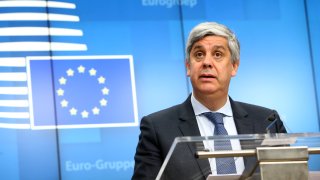
- The ECB has so far insisted that price increases are temporary and it is not yet time to reduce its pandemic-era stimulus measures.
- “We were fooled by some news on inflation in the past, which prompted us to act in the wrong way," Centeno said.
LONDON — The European Central Bank needs to be "even more conservative" in how it reacts to inflation in order to avoid repeating past mistakes, Governing Council Member Mario Centeno has told CNBC.
The central bank is currently under some pressure given that consumer prices have spiked in recent months. Euro zone inflation hit a 10-year high in August, coming in at 3% from a year ago.
The Hurricane season is on. Our meteorologists are ready. Sign up for the NBC 6 Weather newsletter to get the latest forecast in your inbox.
Rising inflation generally requires a tighter monetary policy, but the ECB has so far insisted that the price increases are temporary and it is not yet time to reduce its pandemic-era stimulus measures.
“We were fooled by some news on inflation in the past, which prompted us to act in the wrong way, so we don’t want, definitely, to commit the same sort of errors this time," Centeno, who serves as the governor of the central bank of Portugal, said on Monday.
The ECB shocked markets when it opted to increase interest rates in 2011, just as the sovereign debt crisis was spreading across the bloc. At the time, then-President Jean-Claude Trichet defended the decision citing higher inflation numbers, but critics have described it as a tipping point for the euro zone — and not in a good way.
Money Report
"We need to guarantee favorable financing conditions to all sectors in our economy as we go out of [the] crisis and we are not yet there, we are not yet out of the woods," Centeno said, defending the central bank's current loose monetary policy stance.
The central bank created a new bond-purchase program in March 2020 to support the 19-member bloc throughout the pandemic. This program, known as PEPP, is currently set to last until March 2022 and total up to 1.85 trillion euros ($2.2 trillion).
At a meeting earlier this month, the ECB decided to slow down the pace of purchases, but ECB President Lagarde said it was not tapering — just a recalibration.
"We need to be very — I'd say even more — conservative in the way we tackle this issue," he added.
Speaking to CNBC last week, ECB President Christine Lagarde said that inflation should return to more stable terms next year, "because many of the causes of higher prices are temporary."
These include higher energy prices and bottlenecks in supply chains.
Earlier this month, the ECB estimated an inflation rate of 2.2% at the end of year. This number is then expected to come down to 1.7% and 1.5%, respectively in 2022 and 2023. Revised forecasts are due in December.
But some experts have questioned whether some inflationary pressures are here to stay.
When speaking with CNBC, Centeno reiterated that, so far, inflation is not where the ECB wants it to be before reducing stimulus.
"We already see something going on that front, but when we look at our projection horizon, inflation is not anchored yet at 2%," he said, adding that as a result the ECB needs to continue with its set of measures.






